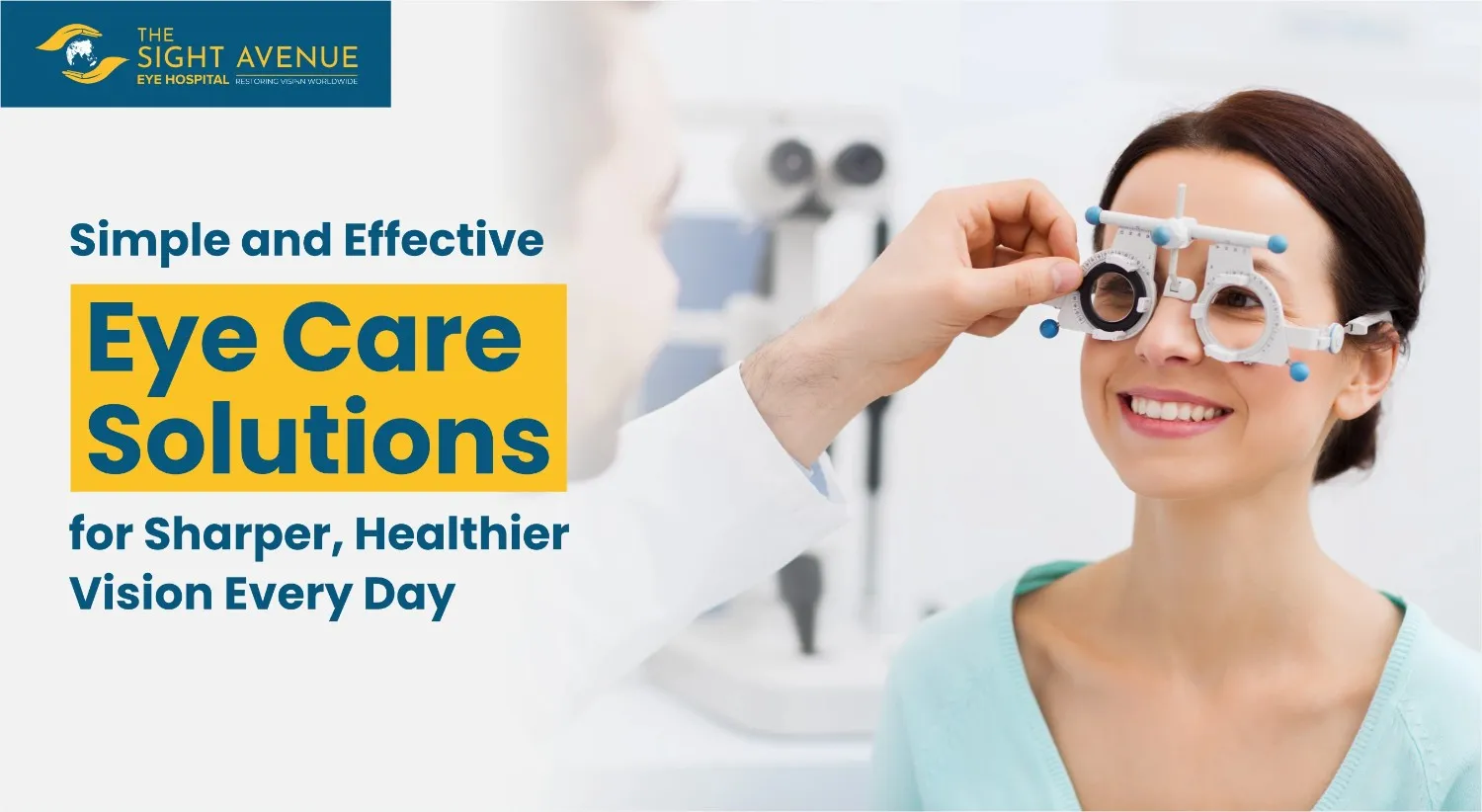Which Is Better Lens Or Lasik Eye Surgery?

Nowadays, numerous vision correction treatments are available, each with unique benefits and procedures. The choice is entirely personal and depends on the person's requirements. In this blog, we’ll explore two major advancements in eye healthcare: LASIK eye surgery and contact lenses. Both options significantly improve vision and help you see this world in a better way. So join us as we provide complete information on LASIK and contact lenses, helping you make an informed decision for better sight.
What Are Contact Lenses And Lasik Eye Surgery?
So we start the discussion with a brief explanation of each treatment option so that you can understand both eye correction methods in a simple way:
Contact Lenses
Contact lenses are small, curved lenses placed directly on the eye's surface to correct vision problems. They offer an alternative to glasses, providing clear vision without the need for frames. They're available in various types, including daily, monthly, and extended wear.
Know More At: Tips for First Time Contact Lens Wearers
LASIK Eye Surgery
LASIK eye surgery uses a laser to reshape the cornea, correcting vision issues like nearsightedness, farsightedness, and astigmatism. This procedure can significantly reduce or even eliminate the need for glasses or contact lenses, offering a long-term solution for clearer vision.
Know More At: Know About Bladeless Lasik Surgery
Comparison Between Contact Lenses And Lasik Surgery
-
Effectiveness and Precision
LASIK: Provides highly precise correction for vision issues such as myopia, hyperopia, and astigmatism. Typically, patients achieve 20/25 vision or better.
Lenses: Contact lenses offer a similar level of vision correction but without the permanence of surgery. Vision can be adjusted by changing the lens prescription as needed.
-
Long-Term Results
LASIK: Offers permanent correction, with most patients experiencing stable vision over the long term. However, some may need enhancements years later.
Lenses: Allow for flexibility in vision correction over time. Users can update their prescriptions regularly to maintain optimal vision.
-
Convenience and Daily Use
LASIK: Eliminates the daily hassle of inserting, removing, and cleaning lenses. It offers freedom from glasses or contacts.
Lenses: Require daily maintenance, including cleaning and proper storage, which can be inconvenient and time-consuming for some users.
Know More At: Difference Between LASIK and Cataract Surgery
-
Cost Considerations
LASIK: A significant upfront cost, which may be offset over time by eliminating the need for ongoing lens purchases and maintenance supplies.
Lenses: Lower initial cost but ongoing expenses for replacements, cleaning solutions, and eye exams can accumulate significantly over the years.
-
Comfort and Safety
LASIK: Generally safe with a low risk of complications. Some patients may experience temporary dryness or discomfort post-surgery.
Lenses: Can cause irritation, infections, or allergies if not properly cared for. Long-term use may lead to discomfort or complications.
-
Lifestyle Impact
LASIK: Ideal for active lifestyles, providing freedom from the constraints of eyewear. Suitable for sports and activities where lenses might be impractical.
Lenses: Can be inconvenient for sports and physical activities due to the risk of loss or damage. Some activities may require additional protective eyewear.
-
Adaptability to Changes in Vision
LASIK: Less adaptable to future vision changes, particularly with age-related conditions like presbyopia.
Lenses: Easily adjusted to accommodate changes in vision, making them a flexible option for individuals whose vision may fluctuate over time.
Know More At: Difference Between LASIK and Cataract Surgery
Benefits Of Lasik Eye Surgery Over Contact Lenses
-
Vision Correction
LASIK: Offers permanent vision correction, eliminating the need for daily lens wear and potential discomfort associated with contacts.
Contact Lenses: Provide temporary correction and require daily insertion, removal, and cleaning.
Know More At: Difference Between LASIK and Cataract Surgery
-
Daily Maintenance
LASIK: Eliminates the hassle of daily lens care, including cleaning, disinfecting, and storing.
Contact Lenses: Require daily maintenance, increasing the risk of eye infections and discomfort.
Know More At: Difference Between LASIK and Cataract Surgery
-
Cost-Efficiency Over Time
LASIK: Though initially more expensive, it eliminates ongoing costs associated with purchasing lenses, solutions, and eye exams.
Contact Lenses: Require regular purchases of lenses and cleaning solutions, leading to long-term expenses.
Know More At: Difference Between LASIK and Cataract Surgery
-
Convenience and Lifestyle Enhancement
LASIK: Provides freedom from glasses or contacts, enhancing convenience for sports, outdoor activities, and everyday life.
Contact Lenses: Can be inconvenient for active lifestyles, with the risk of loss, discomfort, or dryness during prolonged wear.
Know More At: Difference Between LASIK and Cataract Surgery
-
Reduction in Potential Risks
LASIK: Offers a lower risk of eye infections, irritation, and allergies compared to wearing contact lenses.
Contact Lenses: Carry a higher risk of complications such as corneal abrasions, infections, and allergic reactions, particularly with improper care.
Know More At: Difference Between LASIK and Cataract Surgery
Know More At: Common Questions About LASIK Eye Surgery
Conclusion
When considering between LASIK eye surgery and contact lenses, it ultimately boils down to individual preferences, lifestyle, and vision needs. LASIK offers permanent vision correction with convenience and long-term cost savings, while contact lenses provide flexibility and adaptability to changing prescriptions. Both options have their merits, so it's essential to weigh the pros and cons carefully before making a decision. For expert guidance on LASIK or contact lenses, consult a trusted eye specialist at best facilities like The Sight Avenue, acclaimed as the best eye hospital in Gurugram and Delhi.
Eye problems? Searching for an eye specialist near me in Delhi NCR? The Sight Avenue has 5 eye clinics in Delhi NCR. Contact us today!
Eye Hospital in Delhi
- The Sight Avenue
- The Sight Avenue
- The Sight Avenue
E-82-A, Ground Floor, Hansraj Gupta Rd, Greater Kailash I, New Delhi, Delhi 110048
Email:enquiry@thesightavenue.com
Tel : 011-4666 0666
Mob : +91-8883330799
Fortis Hospital, Escorts Okhla, New Delhi
Fortis Hospital, Vasant Kunj, New Delhi





